 Petzlover
PetzloverBoerboel is originated from South Africa but Pugnaces Britanniae is originated from United Kingdom. Both Boerboel and Pugnaces Britanniae are having almost same height. Boerboel may weigh 20 kg / 44 pounds lesser than Pugnaces Britanniae. Boerboel may live 3 years less than Pugnaces Britanniae. Boerboel may have less litter size than Pugnaces Britanniae. Both Boerboel and Pugnaces Britanniae requires Low Maintenance.
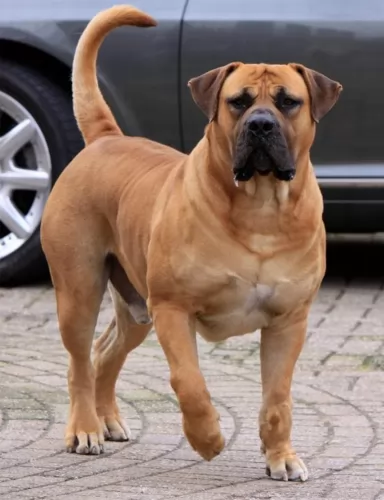 The name ‘Boerboel’ is derived from an Afrikaans/Dutch word, and the large Boerboel dog from South Africa has been specifically bred to be a farmer’s dog. Bred also to be a strong guard dog, the Boerboel is a mix of different African and European breeds, which in all likelihood, will include the Bullmastiff, the Rhodesian Ridgeback and the Bulldog. These dogs were used to hunt baboon and leopard.
The name ‘Boerboel’ is derived from an Afrikaans/Dutch word, and the large Boerboel dog from South Africa has been specifically bred to be a farmer’s dog. Bred also to be a strong guard dog, the Boerboel is a mix of different African and European breeds, which in all likelihood, will include the Bullmastiff, the Rhodesian Ridgeback and the Bulldog. These dogs were used to hunt baboon and leopard.
There is some information that suggests that the Boerboel was brought to South Africa by Jan van Riebeeck in 1652. Other information suggest that the dog is a descendant of the old Boer Hund, a powerful animal which was invaluable to the farmer.
In was in January 2010, that the American Boerboel Club was elected as the AKC’s Parent Club. The Boerboel was accepted into the Miscellaneous Class in the Working dog group.
Pugnaces Britanniae is a dog which is now extinct. There isn't certainty surrounding the origins of the dog but it is thought they descended from dogs brought to Britain way back in the 6th century BC already.
These are ancient dogs, and when you do research you find references dating back to centuries ago. In fact when you read of the Roman conquest of Britain you read of huge dogs, which the Romans referred to as Pugnaces Britanniae.
It is believed that the English Mastiff descended from the ancient Alaunt and Pugnaces Britanniae and that the dog was used as a war dog.
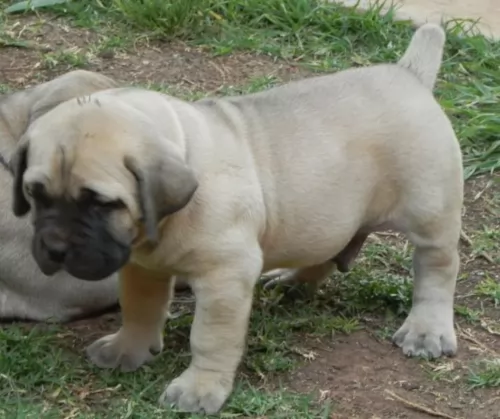 The Boerboel is a big, strong dog with powerful muscles. His height is between 61 – 66cm. He is similar looking to the Boxer dog, just heavier and bigger. The head of the dog is broad and big and the short, smooth coat can be of various shades, with breeders trying to achieve a single color of light tan and with no white. Their coats can also be red, different shades of brown and brindle.
The Boerboel is a big, strong dog with powerful muscles. His height is between 61 – 66cm. He is similar looking to the Boxer dog, just heavier and bigger. The head of the dog is broad and big and the short, smooth coat can be of various shades, with breeders trying to achieve a single color of light tan and with no white. Their coats can also be red, different shades of brown and brindle.
The dog has a black facial mask and the eyes are brown with the ears being of medium length and floppy. The Boerboel’s tail has always been docked, but today breeders are keeping the tail long. Many Boerboel lovers object to this, saying it detracts from the distinctive look of the Boerboel.
The Boerboel can be a wonderfully loyal and loving pet to their owners. They are territorial dogs and suspicious of strangers. This is a dog where it is imperative that they receive training and socialization as a puppy. They have leanings towards being aggressive so they wouldn’t be recommended to first time dog owners, unless of course the first time owners are firm and strong.
Boerboels raised the right way can be gentle giants. They often get bad publicity as regards to aggression, but this is because of they way they have been raised. Boerboels have been bred to be tough and fearless and they make excellent watchdogs. When raised and trained correctly, they make awesome, devoted companions, even around children and other pets.
The Pugnaces Britanniae was a huge dog standing at roughly 67 to 75cm and weighing 52 to 110kg.
He was a heavily built dog, a Mastiff type dog that had a large head, broad muzzle with fairly loose skin around the mouth, brown eyes, a broad back and rump, muscular legs and floppy ears with a long tail. In fact the Mastiff, thought to have descended from the ancient Alaunt and Pugnaces Britanniae, gives you an idea of what the dog looked like. He no doubt has a short, smooth coat available in fawn, tan or brindle and with the black mask.
The Pugnaces Britannia was a naturally aggressive dog so it is to be expected that he wouldn’t automatically have been a good family dog, possibly being aggressive around children and other dogs. They were intelligent and were no doubt taught some simple commands.
They were also very territorial dogs, wanting to instinctively chase and attack unknown people and animals. They were strong minded, confident, loyal ad loving dogs towards their owners, being protective of them, wanting to please them.
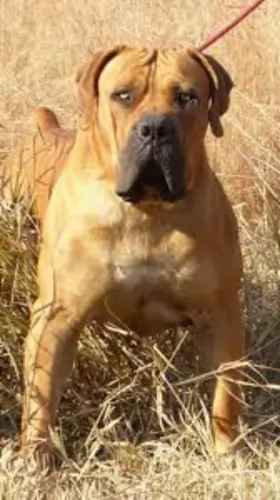 A well trained, socialized Boerboel makes a splendid pet. This is one breed known to have excellent guard- and watch dog characteristics. Boerboels are known for being protective when necessary. When not on guard, they make wonderful pets. He’ll need plenty of exercise, but he loves to also spend time indoors with his human family.
A well trained, socialized Boerboel makes a splendid pet. This is one breed known to have excellent guard- and watch dog characteristics. Boerboels are known for being protective when necessary. When not on guard, they make wonderful pets. He’ll need plenty of exercise, but he loves to also spend time indoors with his human family.
This a a bold, fearless dog who becomes devoted to his family. With the right training he is obedient and affectionate and knows how to behave appropriately indoors- and outdoors. For such a big dog, the African Boeboel’s temperament can be surprisingly gentle and affectionate around the family that he loves.
The Pugnaces Britanniae may well have been a large dog and quite imposing to look at but he was in all likelihood a good-natured pet who got on well with his family members, being loyal and loving if brought up correctly.
Long ago dog training and socialization didn’t exist but a large dog like this would have to be socialized and trained to become obedient and an amicable all-rounder.
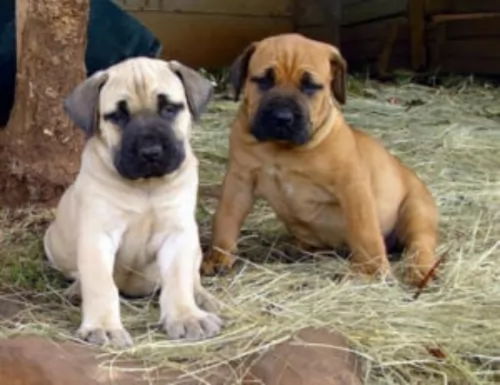 Many health problems experienced with any dog are found in the way dogs are fed, the way they are exercised and the way they are attended to when they are ill. Boerboels are healthy dogs and suffer fewer health defects than most similar breeds. The average life expectancy of a Boerboel is about 10 to 12 years. There are one or two health issues you’ll want to watch out for with your Boerboel.
Many health problems experienced with any dog are found in the way dogs are fed, the way they are exercised and the way they are attended to when they are ill. Boerboels are healthy dogs and suffer fewer health defects than most similar breeds. The average life expectancy of a Boerboel is about 10 to 12 years. There are one or two health issues you’ll want to watch out for with your Boerboel.
This aliment is typically found in large breed dogs. It’s a problem caused by a malformation of the hip joint. Over time hip dysplasia causes discomfort, pain and even arthritis and lameness. It is genetically inherited, with its severity being influenced by environmental factors. There are treatments available to alleviate the symptoms and make the dog more comfortable.
The Boerboel has plenty of muscle mass, and because he is such a large dog with a big appetite, he can lean towards obesity. Plenty of activities will be imperative to maintain muscle mass and ward off obesity. Over-eating suppresses the immune system, so over-feeding your dog simply contributes to ill health.
The Pugnaces Britanniae could live to 10, 11 or 12 years of age with good care. Large Mastiff type dogs like this would have had to watch out for common canine diseases such as hip dysplasia, cancer and bloat.
In those days, no screening tests were available for health problems like this. Gastric dilatation volvulus or bloat is a common health issue with large, deep chested dogs where the stomach fills with gas and the stomach twists. Its a life threatening disease.
Canine heart disease is another serious health issue with these mastiff type dogs. Early stages with heart disease show there may well be no symptoms at all. However, as the heart disease progresses towards congestive heart failure, the dog will have symptoms such as fatigue, difficulty with breathing, weight loss, a distended abdomen and coughing.
A dog with symptoms like this would have to see a vet immediately.
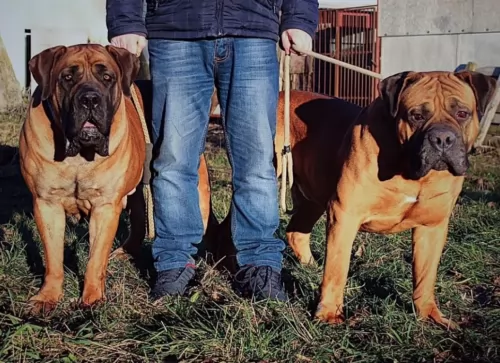 Boerboels are a robust breed and their short hair doesn’t shed heavily. Your Boerbul will require a thorough brushing twice a week to remove loose hair and to keep the coat shiny and healthy.
Boerboels are a robust breed and their short hair doesn’t shed heavily. Your Boerbul will require a thorough brushing twice a week to remove loose hair and to keep the coat shiny and healthy.
Boerboels, just like any other dog, should have their teeth brushed regularly to prevent tartar and plaque build-up. Left unattended, your pet can battle with tooth decay and gum disease.
Your Boerboel puppy will need ‘large breed puppy’ dog food. Speak to your veterinarian about wet- or dry kibble choices. An adult Boerboel will certainly need raw meat in his diet. When you do research, you find that the best Boerboel breeders are advocates for raw feeding. Home made food with rice, vegetables and meat as well as the best quality commercially manufactured dog foods for large breeds are excellent choices but raw meat is imperative as part of every dog’s diet.
The diets of ancient dogs were different to what they are today, as in those days there were no commercially manufactured dog foods. Dog owners in all likelihood tossed scraps to them which included starch.
Today a large dog such as the extinct Pugnaces Britannia would have no doubt been fed a high quality kibble from a leading brand and packed with minerals and vitamins specially formulated for a large dog breed.
Homemade food is also important, but not any kind of food – it has to be food which doesn’t upset the dog’s digestive system. Simple but nutritious food such as boiled chicken, brown rice or pasta, sweet potatoes, carrots and spinach is ideal for a dog, and when it is chopped up can be added twice a week to the dry kibble for a tasty, healthy treat.
Raw meat added in occasionally is also hugely beneficial. No dog should ever be without fresh, cool water constantly available.
As a short haired dog, the Pugnaces Britanniae would have required a brushing twice a week to rid the dog of loose hairs. Maybe in those days they didn’t check their dogs over to see that all was well, but today you would need to check the inside of the ears. If the insides were red, it could be a sign of an ear infection brought on by dampness, excess wax and dirt.
The eyes would need to be checked for discharge and the teeth checked a well. One rotten tooth can cause a lot of havoc. The nails of the dog would have had to be checked and clipped as well.
As a war dog, the Pugnaces Britanniae would have been fit. He is a big dog and while they require exercise such as walks and hide-and-seek type of games, he isn’t the kind of dog that would go running with you on a jog, as large, heavy dogs can overheat easily.